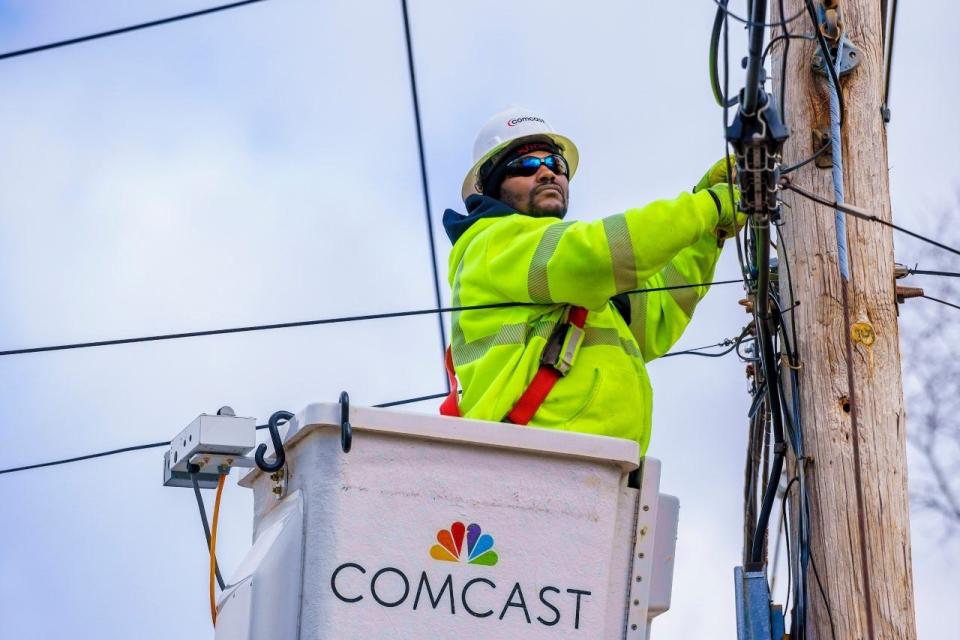It’s essential for Tennessee to use historic internet access funding effectively | Opinion
With the passage of the historic federal infrastructure bill in early November, an unprecedented amount of funding is headed to states across the country for broadband expansion and development, including right here in Tennessee.
At a minimum, the state is expected to receive $100 million to help expand broadband access to our residents.
This infusion of federal funding is crucial for Tennessee and its residents. The White House estimates that at least 17% of Tennesseans lack an at-home internet subscription, putting them at a significant disadvantage to participating in the 21st century economy, and putting students at risk of falling behind in their education.
In rural communities, which tend to have less access to high-speed internet, more than two-thirds of educators reported that better internet access is needed to support remote learning according to an April 2020 Vanderbilt study.
Hear from Tennessee's Black voices: Get the weekly newsletter for powerful and critical thinking columns.
Reasons for this disconnect are varied
At least 5.9% of Tennesseans live in areas where there is no broadband infrastructure at all, making it impossible for them to get connected even if they wanted to. Even when connection is available, cost remains a barrier. A recent study from EducationSuperHighway found that nearly four out of 10 households in the state say they cannot afford internet service.
The need for high-speed internet investment is clear, and officials are optimistic that this influx of federal funding could help make real progress in closing the digital divide, and so are we.

However, in order for this funding to fulfill the potential it could have for the state of Tennessee and its residents, we must ensure the federal dollars are spent effectively and efficiently to help those who need it most.
That’s where our organizations come in: Heartland Forward, a think-and-do-tank focused on boosting economic performance in the 20 states in the middle of the country, and The Ayers Foundation, dedicated to improving the quality of life for Tennesseans, especially in rural Tennessee, are focused on this vital issue.
We stand ready to work with policymakers, providers, community groups and other key stakeholders to ensure every federal dollar for high-speed internet access is well spent.

To this end, we support policies and programs in Tennessee that are guided by these principles:
Public investment in high-speed internet should lift everyone up. That means addressing barriers to access, affordability and adoption.
Communities should drive solutions that meet their own unique needs. But to do so, many communities—especially smaller ones with limited staff capacity and expertise—need technical assistance, planning support and clear authority to determine what’s in their best interest.
Regulations and standards should maximize investments for long-term impact.
Tennessee has a real opportunity
Above all, we believe this work is so crucial because access to high-speed internet will have a positive impact across our economy, especially at the local level. Studies have shown that greater broadband availability leads to economic growth—with expanded internet connectivity comes the potential to create hundreds of thousands of jobs and increase economic output by hundreds of billions of dollars.

Tennessee will receive funds in the coming months that have the potential to truly transform the lives of the more than 492,000 Tennesseans who currently lack adequate internet access and boost the future economic potential of our state, but we all need to work together to ensure that goal becomes a reality.
To maximize these opportunities, some substantial work is already underway in rural communities across the state. From Henry to Campbell, Cocke to Decatur, several counties have already been utilizing technical assistance for broadband planning supported by the State of Tennessee and The Ayers Foundation COVID Relief Foundation, with expertise from Rural Innovation Strategies, Inc.
But continued cooperation of an even broader coalition of providers and stakeholders will be necessary to ensure that Tennessee is being set up for connectivity success in the long-term.
Heartland Forward and The Ayers Foundation are here to help and support.
We look forward to collaborating with partners across the state in connecting all Tennesseans with the high-speed internet access they need to succeed in school, in the workplace and in our growing economy.
Janet Ayers is President of The Ayers Foundation.
Angie Cooper is the Chief Program Officer of Heartland Forward.
This article originally appeared on Nashville Tennessean: Tennessee can reach its full potential with internet access funding

